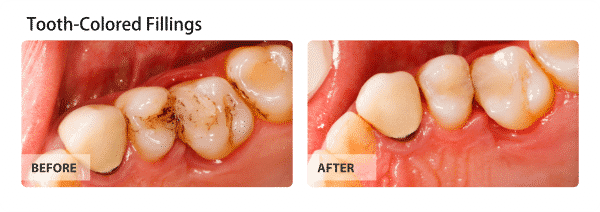Prevent & Treat Cavities | Dental Designer, North Plainfield

Tooth decay is one of the most common oral health problems that people of all ages face. Tooth decay or cavities leads to many dental problems that can make a person uncomfortable, distressed, and lead to other health problems too.
Dr. Harmanpreet Kaur, based out of Plainfield, New Jersey, comes across many patients suffering from cavities and dental issues arising out of cavities. One of the most prominent dental care services provided by Dental Designer, NJ is cavity prevention and cavity management for the patients ranging from young children to adults.

What Is A Cavity Or Tooth Decay?
Cavities or tooth decay is the destruction of your tooth’s outermost layer called the enamel. The enamel is a protective cover over the tooth which defends the tooth against bacteria and other elements that can cause permanent damage to the tooth.
Tooth decay occurs when foods containing carbohydrates (sugars and starches) such as bread, cereals, milk, soda, fruits, cakes, or candy are left on the teeth. Bacteria that live in the mouth digest these foods, turning them into acids.
When cavities begin to form they develop tiny openings or holes in the hard surface of the teeth. If left untreated the cavities get larger and begin to damage other teeth, the gums and lead to extreme tooth pain, tooth loss, and infections.
Dr. Harmanpreet Kaur advises regular visits to the dentist to prevent cavities or mitigate the damage for pre-existing cavities. Cavities are the world’s most common health problem and are found even in toddlers!
What Are The Symptoms Of Cavities?
Tooth sensitivity is one of the biggest signs of tooth decay or cavities. Whether you’ve just taken a sip of soda or you’re eating a spoonful of cereals, you can’t get past the weird tingling sensation that’s emitting from your teeth – that is a sign of increased tooth sensitivity.
Tooth sensitivity occurs when external stimuli reach the dentin layer of your teeth. The dentin layer covers the nerves in your tooth and provides you with an additional layer of protection from external elements. That’s why every time you drink that is hot or cold, you’ll feel sensitivity.
If you experience tooth sensitivity or tooth pain, it might be a sign of cavities. Dental Designer, NJ advises you to book an appointment immediately because only an evaluation by a professional dentist can give you the right answers about your oral health condition.
What Are The Different Treatments For Dental Cavities Or Tooth Decay?
Dental Designer, NJ offers the following cavity prevention and cavity management treatments to its patients:
-
Fluoride Treatments
Fluoride is often called nature’s cavity fighter. Fluoride is a naturally-occurring mineral. It helps prevent cavities in children and adults by making the outer surface of your teeth (enamel) more resistant to the acid attacks that cause tooth decay. It is routinely present in most commercially available tubes of toothpaste and mouthwashes.
If your cavity is just beginning and is not very deep or has not yet affected the pulp inside the tooth, then fluoride treatments are a good way to treat cavities. Fluoride treatments may be liquid, gel, foam or varnish that’s brushed onto your teeth or placed in a small tray that fits over your teeth.
Dr Harmanpreet Kaur, an accredited Dentist will take a call on what type of fluoride treatment will be most effective for you.
-
Dental Fillings
There are cases where the tooth decay has progressed beyond the stage where fluoride treatments could be effective but the entire tooth has not been damaged yet. In such cases, Dr. Harmanpreet Kaur, the Board-certified Dentist of Dental Designer, NJ may prescribe dental fillings.
Dental fillings are restorative materials made of composite resins, porcelain, or dental amalgam that is a combination of several materials. Dental fillings restore the damaged tooth in such a way that tooth extraction or other invasive procedures can be avoided.
-
Dental Crowns And Bridges
When Dr. Harmanpreet Kaur identifies cases of tooth decay in multiple teeth or cases that are beyond the dental fillings stage and are now affecting the overall structure of the mouth and jaws of the patient, then it may be necessary to explore the Dental Crown or Bridge treatment option.
For extensive decay or weakened teeth, you may need a crown — a custom-fitted covering that replaces your tooth’s entire natural crown. The dentist Dr. Kaur, drills away all the decayed areas and enough of the rest of your tooth to ensure a good fit. Crowns may be made of gold, high strength porcelain, resin, porcelain fused to metal or other materials.
Bridges are used to fill in the gaps left by missing teeth and are anchored in place by the natural teeth or crowns nearest the empty space. Both crowns and bridges are non-removable and must be cemented in place by a licensed dentist. Patients who get crowns or bridges to restore their smiles achieve both the function and appearance of natural, healthy teeth.
-
Root Canal
A root canal is an intensive dental procedure which becomes necessary when the cavity or tooth decay reaches the pulp of the tooth. This is a treatment prescribed by Dr. Harmanpreet Kaur, to repair and save a badly damaged or infected tooth instead of removing it. The diseased tooth pulp is removed. Medication is sometimes put into the root canal to clear any infection. Then the pulp is replaced with a filling.
Root canal treatments need to be handled by dentists who have rich experience and mastery over the procedure since this is a serious dental procedure.
-
Tooth Extraction
If the tooth decay or cavity has ravaged the tooth beyond saving then tooth extraction is the right option for the patient. Dr Harmanpreet Kaur performs a tooth extraction in such a way that it is painless for the patient.
Once the tooth is extracted it is replaced by a dental implant or if multiple teeth are extracted then getting a bridge is the right way to move forward.

What To Expect At An Appointment With Dr Harmanpreet Kaur For Cavity Treatment?
Dr Harmanpreet Kaur is a qualified and accredited dentist based out of Plainfield, New Jersey who is known for thorough evaluations before reaching a diagnosis.
If you have an appointment at Dental Designer, NJ, then you can expect a one-on-one discussion with Dr Kaur about your tooth pain or tooth sensitivity. She will also ask you about your oral care habits and dietary choices to understand your case completely.
The next step is a dental exam. Dr Harmanpreet Kaur will examine your mouth and teeth. She will use dental instruments to check whether there are any soft areas or visible holes in the mouth.
In case she is satisfied with this evaluation then she will prescribe the course of treatment. In case she believes more data is necessary to check the damage done by cavities, then she will take dental X-rays of your teeth.
Once the examination, discussion and x-rays are done, Dr Harmanpreet Kaur will inform you of the severity of your cavities, what areas they are affecting and what course of treatment is prescribed.
You can use this time to ask her all your doubts including those about dental insurance, risks related to the treatment etc. Dr Kaur will clear all your doubts and begin your cavity treatment.
What To Expect Before The Cavities Treatment?
After the initial diagnosis, Dr Harmanpreet Kaur will schedule an appointment for your next visit where the actual treatment will take place. She will give you specific instructions regarding your food and meal timings, you may be given some pain management medication between the two appointments to help alleviate the pain.
Dental Designer, NJ advises patients to follow the instructions given by Dr Kaur to the letter for preventing any further damage to the teeth.
What To Expect During The Recovery From Cavity Treatment?
The recovery from cavity treatments is generally non-cumbersome and easy. There are little pain and discomfort post the treatment, but Dr. Harmanpreet Kaur prescribes pain management medication to minimize any pain felt by the patients.
There will be certain restrictions on the type of food or beverage patients eat or drink after the treatment. Generally, patients are told not to eat or drink anything for approximately 30-40 minutes after their visit to the dentist.
Other elements of the recovery will be based on the specifics of the treatment and will be shared by Dr. Kaur with you during your visit.
Are Cavity Treatments Covered Under Dental Insurance?
YES! And the best part is Dental Designer, NJ accepts major insurance providers of the country. So you do not need to worry about the payments, you only need to take care of yourself.
How Are Cavities Treated At Dental Designer, NJ?
As mentioned earlier there are several different treatment options for cavity management.
Dr Harmanpreet Kaur, the accredited Dentist at Dental Designer, NJ will take a final call on what treatment plan is best for your unique case. Based on the option chosen your treatment will begin. More information on each of these options is available on separate service pages of the treatment.
- Fluoride Treatments
These are the easiest and simplest of all cavity treatments. Dr Harmanpreet Kaur will apply a highly concentrated amount of fluoride to your tooth/teeth via rinse, foam, gel or varnish using a swab, brush, tray or mouthwash.
This takes a few minutes to apply since it will be applied thoroughly to the affected teeth.
- Dental Fillings
During your visit, your gums and teeth will be anesthetized with a local anesthetic near the site of the filling. Once the area is numb, the decayed or damaged portion of your teeth will be removed to make room for the new tooth-colored filling. A resin will be placed over the area and cured with a hand-held light for less than a minute. The new filling will then be shaped and polished before the procedure is complete.
- Dental Crowns and Bridges
- Root Canal
- Tooth Extraction
You will receive a local anesthetic, which numbs the area around your tooth so you’ll feel only pressure, not pain, during the procedure. Dr. Harmanpreet Kaur will use an instrument called an elevator to loosen the tooth and forceps to remove it. There will be no pain during the procedure.
Consult Dr. Harmanpreet Kaur

As a general dentist, Dr. Harmanpreet Kaur is committed to providing comprehensive care and clinical excellence.
She has more than 15 years of experience as a General Dentist and is a member of the American Dental Association and the American Academy of Implant Dentistry.
Dr. Harmanpreet Kaur attended New York University College of Dentistry for her dental education (DDS) and graduated with Honors. Before taking over Dental Designer in 2016, Dr. Kaur worked in several high-quality dental offices in Central Jersey.
She is committed to offering her patients the same level of clinical excellence as she learned from her world-renowned teachers/practitioners. Passionate about the importance of continuing education, Dr. Kaur has completed extensive advanced training in cosmetics, oral surgery, and anesthesia.

